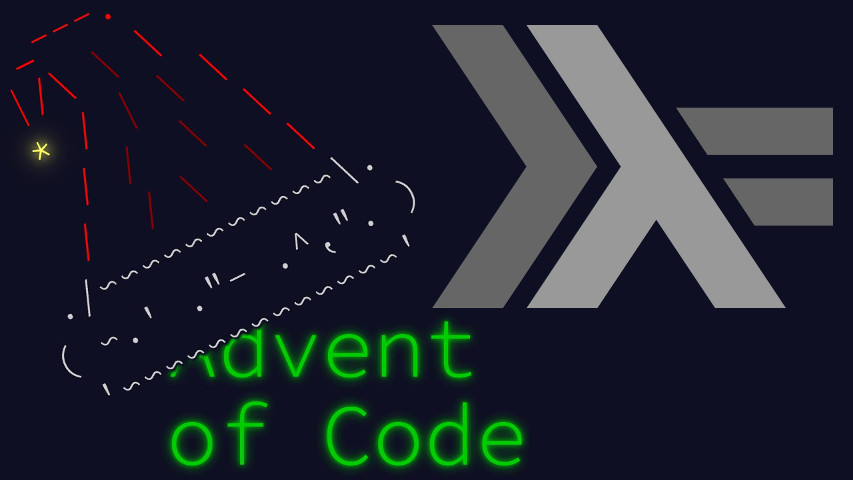The Advent of Code day 3 problem “Mull It Over” is the first of the year to get us to do a bit of simple parsing. Of course, it was quicker to get my stars with two Perl one-liners, but as this series is mostly Haskell-themed I won’t talk too much about that. On the other hand, strongly-typed regex-based parsing isn’t really practical, so the imports will revolve around Megaparsec instead. And they’re first, as this is still literate Haskell.
import Control.Arrow ((&&&))
import Data.Bool (bool)
import Data.Void (Void)
import Text.Megaparsec (Parsec,(<|>),parseMaybe,try,anySingle,many,some)
import Text.Megaparsec.Char (char,string,digitChar)
type Parser = Parsec Void StringThe core of the problem is parsing those mul(X,Y)
tokens. That’s two parsers’ worth of code.
int,mul :: Parser Int
int = read <$> some digitChar
mul = try $ (*) <$> (string "mul(" *> int <* char ',') <*> int <* char ')'int is straightforward; mul could be worth
a word:
- the gist is
(*) <$> int <*> int stringandcharare there to provide the context. Crucial, but readable.- parentheses and the rest of the
*>and<*operators are mild precedence hacking to ensure the only meaningful arguments to(*)are the twointsubparses. tryis there to ensure a partial parse isn’t binding. The input is ostensibly hostile; it’s not just likely there will be occurrences of the string"mul("that are not to be parsed as a meaningful entry: they’re literally right there staring at you in the face from the problem statement!
Now indeed we are provided with corrupt input, so the essence of the
challenge is to ignore what isn’t parsable. Most of that will be
accomplished with the skipAnd combinator, which parses its
argument if that works, else skips a character and tries again.
uncorrupt :: Parser a -> Parser [a]
uncorrupt =
let skipAnd p = p <|> anySingle *> skipAnd pOf course, all of those skipped character are considered as parsed,
so we’ll need try again to avert failure.
in (<* many anySingle) . many . try . skipAndskipAnd to ignore garbage before any useful input;
try to prevent committing; many to do so
repeatedly and collect the results.
The remaining (<* many anySingle) is there to ignore
any remainders, but still consume it all. That’s because we’re going to
be using the parseMaybe driver, which expects end of input
to be reached else it fails.
We have all we need to package up part 1:
part1 :: String -> Maybe Int
part1 = fmap sum . parseMaybe (uncorrupt mul)In part 2, an additional construct is to be recognized:
don't() suspends interpretation until do() is
encountered.
There are many ways to deal with this. I chose to just parse them as
additional parsable constructs. It works because they can’t be a part of
the single other parsable construct, mul().
dodont :: Parser Bool
dodont =
True <$ string "do()" <|>
False <$ string "don't()"Ah, but mul returns Ints, and
dodont returns Bools. I’ll need to reconcile
them using Left and Right.
part2 :: String -> Maybe Int
part2 =
fmap (sum . trigger) .
parseMaybe (uncorrupt (Right <$> mul <|> Left <$> dodont))The parsing part itself returns a stream of
Either Bool Int. A little helper will help us convert that
back into a sum of the relevant part of the Ints by
returning only those after a True and no False
yet.
trigger :: [Either Bool a] -> [a]
trigger = go True where
go p = \case [] -> []
(Left p':xs) -> go p' xs
(Right x:xs) -> bool id (x :) p (go p xs)Nothing fancy, just accumulate the input while we’re on a
True (bool id (x :)), updating state when
encountering a Left.
One more wrapper to conclude the Haskell:
main :: IO ()
main = interact $ show . (part1 &&& part2)All good.
Now did I mention I got my stars with Perl one-liners?
Perl rocks at string processing and native regexes, so the general
idea is to just match all of the mul\(\d+,\d+\) we can see,
and compute from there. Nothing bad can happen, mostly because the
pattern can’t interfere with itself.
In my case, where part 2 made this interesting was twofold:
- how to handle do’s and don’ts. You don’t want to blindly erase
anything in-between, because… matching is greedy by default, so
don't()do()mul(1,1)do()would ignore everything, while the intent is to perform that innermul. So use non-greedy matching/don't\(\).*?do\(\)/ - but wait, what happens on this:
mul(6,don't()do()7)?
So theoretically, you don’t want to simply just ignore what’s between
a don’t/do pair, as that risks creating a mul that wasn’t
valid to begin with in the original input.
So if you go that route, you replace with anything that can’t
interfere with a mul.
Sadly, it doesn’t really matter: it turns out there are no such occurrences in my input.
What a missed opportunity!



